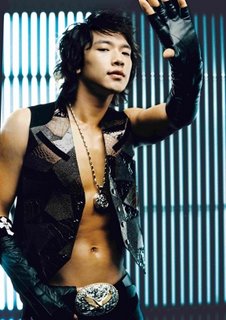
Anyhow, Rain seemed like a very nice, polite young man. Very sincerely and earnest, if a tad vacuous. Ask him about what music he likes, and you hear Usher and Michael Jackson. Ask him about what he had to learn to be successful in the United States, and he talked about world-renowned choreographers and expert stage show producers. Raised on music industry jargon, he talked about "markets" and storytelling concert concepts far more than songwriting or music.
It was a pleasant-enough event, but it got me thinking, "Why is this all Korea has?" Music is a spectrum, with Justin Timberlake et al. on one end, a bunch of kids in their garage or some local dive on the other end, and a whole wealth of options in between. That is not only true of pop, but rock, jazz, even classical. But for some reason, Korea only latches on to extreme pop, gloss, commercial end of the spectrum.
Actually, the reasons are not that hard to figure out. Korea is not a diverse market for any product. The music industry overwhelmingly focuses on the teen market, recycling the same ideas for over a decade now. Etc. But the No. 1 reason Korea's music market is so lame is that the government has deliberately made it so with useless, onerous regulations.
The worst regulations are the cabaret laws. Korea is full of byzantine regulations about how live music can be played. If you have live music and alcohol, then you need a cabaret license, which is expensive and generally only for sleazy clubs catering to older, trot-loving clientel. It is pretty much impossible for a small, underground bar to afford a cabaret license. Without a license to serve alcohol, how many college kids are you going to get? Young adults who want to blow off steam and have a good time are going to regular bars before they are going to go to hole-in-the-wall playing live music (and without the alcohol income, who can afford to make a place look nice?).
The regulations are capricious in a whole host of other ways (I'm sure I know just a fraction of the problems). For example, getting a foreign act for a small club is all but impossible. And bringing in the best from around the region is a great way to get young people excited about musical possibilities, to raise the standard here.
Regulators also make it pretty much impossible to have genre-specific radio stations. So radio in Korea is all over the place, with each station doing a little of everything and a whole lot of nothing. As a result, it is that much harder to cultivate an audience and a depth of knowledge about any genre.
Which then got me thinking about how government regulation in Korea cripples and kills so many areas, especially in entertainment and culture. Television suffers from the ridiculous Korea Broadcasting Advertising Corporation and Korea Broadcasting Commission. Movies have the screen quota (although not as badly as they did until recently) -- just one more example of the government doing something to be "fair," and in the process destroying creativity, art and all the good stuff in favor of ugly, stupid corporations (see this earlier post). I should put together a rant on the whole mess, but I am not quite ready yet. To come... soon, perhaps.


No comments:
Post a Comment